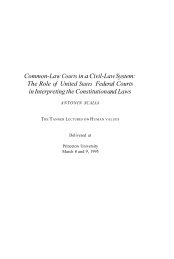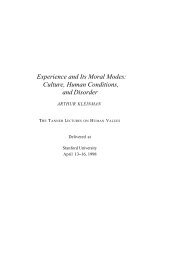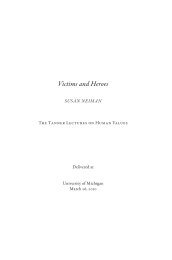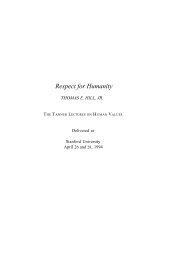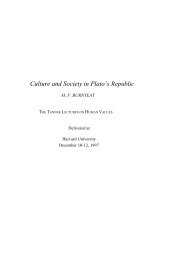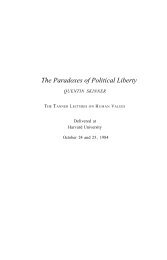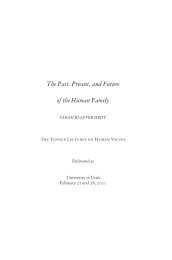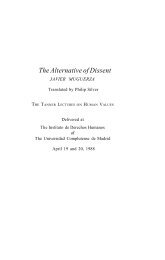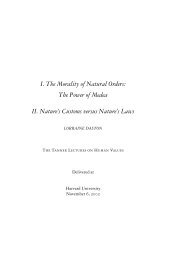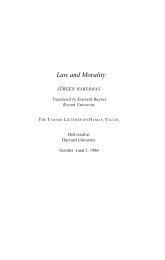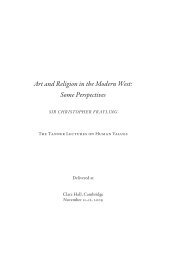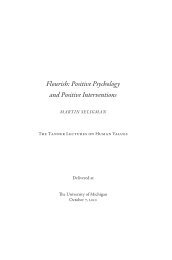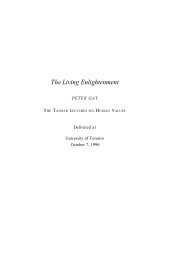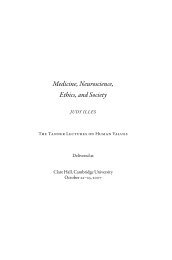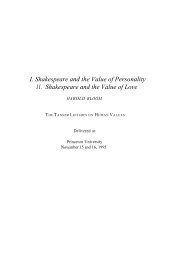Slote, Michael - The Tanner Lectures on Human Values
Slote, Michael - The Tanner Lectures on Human Values
Slote, Michael - The Tanner Lectures on Human Values
You also want an ePaper? Increase the reach of your titles
YUMPU automatically turns print PDFs into web optimized ePapers that Google loves.
78 <str<strong>on</strong>g>The</str<strong>on</strong>g> <str<strong>on</strong>g>Tanner</str<strong>on</strong>g> <str<strong>on</strong>g>Lectures</str<strong>on</strong>g> <strong>on</strong> <strong>Human</strong> <strong>Values</strong><br />
Surely there are circumstances where neither of these c<strong>on</strong>siderati<strong>on</strong>s,<br />
or anything similar, is relevant, but where, n<strong>on</strong>etheless,<br />
we would be inclined to take <strong>on</strong>e copy rather than two. But<br />
why should this be so? <str<strong>on</strong>g>The</str<strong>on</strong>g> obvious answer, not <strong>on</strong>ly in the light<br />
of what has already been said but also <strong>on</strong> grounds of sheer comm<strong>on</strong><br />
sense, is that some of us are quite naturally reluctant to take<br />
more than we need, when we can have everything we need without<br />
doing so. One takes the single paper because it answers <strong>on</strong>e’s<br />
need for informati<strong>on</strong>; <strong>on</strong>e has no need for two newspapers. (I<br />
am assuming that <strong>on</strong>e is not worried about losing the single newspaper<br />
and/or that the difference between the chance of losing<br />
two and the chance of losing <strong>on</strong>e is negligible.) But in the circumstances<br />
I have described <strong>on</strong>e is equally well off whether <strong>on</strong>e<br />
has <strong>on</strong>e newspaper or two, so if the absence of need moves <strong>on</strong>e to<br />
reject the offer of two newspapers it does so quite independently<br />
of any c<strong>on</strong>siderati<strong>on</strong> of well-being and of the whole issue of optimizing<br />
or satisficing. This may help us to see that the fact that<br />
something is absolutely unnecessary or much more than <strong>on</strong>e needs<br />
really is a reas<strong>on</strong> for acti<strong>on</strong> and choice that has force and validity<br />
with most human beings - even people who are initially dubious<br />
about satisficing will presumably see the point of rejecting the<br />
offer of two copies of the morning paper.<br />
However, it might be possible to grant total lack of need a<br />
rati<strong>on</strong>al status in cases of the sort I have just menti<strong>on</strong>ed, while<br />
denying the rati<strong>on</strong>ality of satisficing as described earlier. One<br />
might say that c<strong>on</strong>siderati<strong>on</strong>s of well-being are always lexically<br />
prior to c<strong>on</strong>siderati<strong>on</strong>s of n<strong>on</strong>-need, so that the fact of n<strong>on</strong>-need<br />
can be used to break ties in situati<strong>on</strong>s, like that of the morning<br />
newspaper, where <strong>on</strong>e is (by hypothesis) equally well-off whichever<br />
way <strong>on</strong>e chooses, but cannot overcome differences of wellbeing.<br />
<str<strong>on</strong>g>The</str<strong>on</strong>g> fact that a certain level of well-being or enjoyment is<br />
much more than <strong>on</strong>e needs would then fail to justify rejecting<br />
such well-being or enjoyment in favor of what was (merely) good<br />
enough, and satisficing moderati<strong>on</strong> as we have described it would



